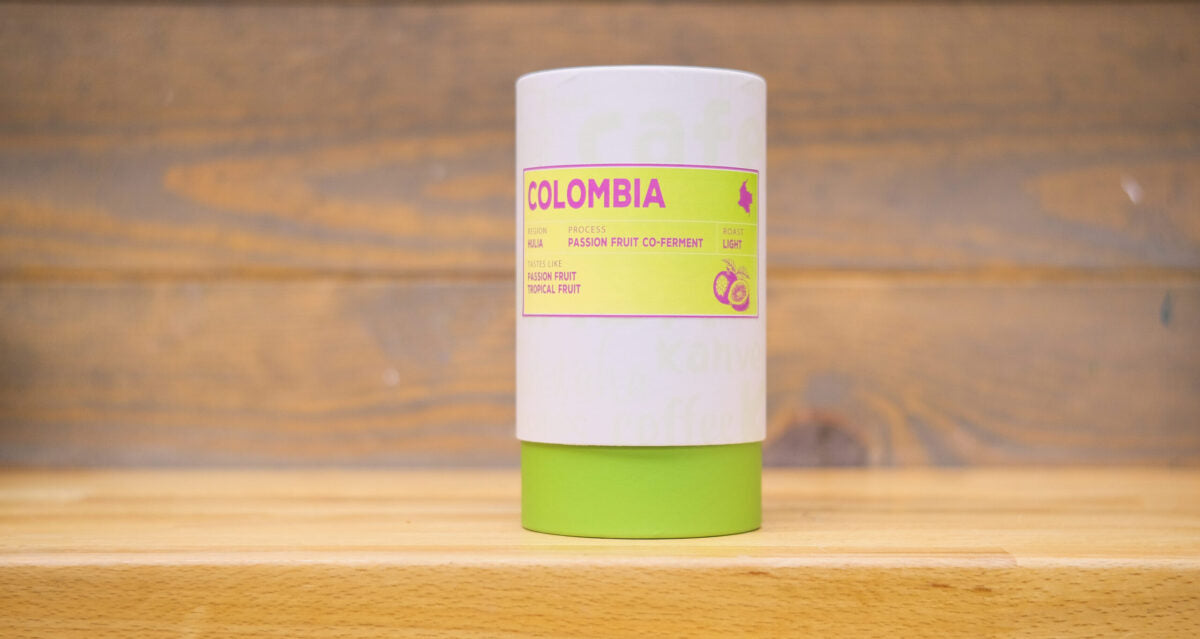Let’s talk about co-fermentation: the process, the purpose, and the controversy.
But before we tackle that, what is co-fermentation? Like other processes (natural, washed, honey, etc.), co-fermentation is a way to create flavor. In this process, the producer introduces an external element such as fruit or spices during the fermentation phase to infuse natural flavor notes into the coffee seed. You can read about the other various processes in this previous post.
With all coffee processes, there are many factors that contribute to the resulting flavor profile spanning from the quality of the soil all the way to the final brewing method. A major factor that contributes to taste is the roast. The roasting profile sways the outcome of a coffee and can make-or-break flavor profiles. While these factors are extremely important to the end result, the fermentation period arguably contributes the most to flavor.
We now offer a Colombian coffee that is co-fermented with passionfruit! For this specific coffee, the cherries first undergo a 24-hour pre-fermentation in plastic bags, followed by another 24 hours in cherry. After the pulp is removed, the beans are co-fermented anaerobically with dehydrated passionfruit for 5 days, allowing the coffee to absorb rich, fruity flavors. The beans are then dried mechanically over 10 days to ensure even moisture levels, followed by a 5-day stabilization period.
This extensive process is unique and yields some exciting new tasting notes but is a controversial topic within the specialty coffee community!
Why so many co-fermentation haters?
Some argue that introducing an additive to the coffee process is cheating. At this time, even Specialty Coffee Association sponsored competitions do not allow the use of co-fermented coffee. To that argument, we give a slight side-eye because technically, all fermentation is “adding” flavor to coffee. Using the coffee cherry to infuse flavor into the seed is widely accepted and has been common practice since Yemeni farmers introduced the method in the 16th century. We have been “adding” flavor to coffee seeds for centuries!
Some fight against it for allergen reasons. Depending on what ingredient you are using to co-ferment with coffee beans, integrating another ingredient has the potential to introduce allergens which could affect an unsuspecting coffee drinker with allergies. Main concerns include co-fermenting with almond milk, gluten or soy products, dairy milk, or coconut. Typically, these ingredients are not widely used for co-fermentation practices, but they have been used in some cases. Anyone with these medical concerns should absolutely do extra research when purchasing co-fermented coffees. Obviously we understand the allergen concerns, but saying that co-fermentation is cheating? That feels like a stretch.
Where do we draw the line? What do we consider “cheating”?
Some roasters add flavor after roasting. They do this by taking a flavored oil or syrup and mixing it in with the roasted beans. This is most commonly used to cover bad, natural flavors in commodity coffees. In our opinion, it is absolutely cheating to add in flavor after the roasting process is completed.
This idea of adding flavored oil after the fact is very different from co-fermented or infused coffee processes. Unlike these added oils or syrups that cover bad flavor, co-fermentation involves careful consideration, science, and skillfully crafted ingredients. The producer carefully chooses additives that make sense according to the natural flavors of the coffee. The producer is not covering up bad flavor, rather, they are delicately highlighting the natural flavors of the bean by introducing an ingredient that complements and balances the natural tasting notes.
Why do we love co-fermentation?
This process gives complexity to the cup. We love how each process yields such different results. Co-fermentation is an exciting process that creates an entirely new realm of possibility when it comes to tasting notes. It also allows coffee farmers to experiment with new ways to sell more coffee, drive more sales, and provide better wages for their employees. Co-fermentation also helps the local economy by opening a door for coffee farmers to purchase indigenous fruits and spices from the community. And of course, co-fermented coffee tastes great!
So, whether you are for or against this up-and-coming coffee process, we hope you now understand more about this process and can understand our decision to roast a co-fermented Colombian coffee. Next time you’re in a Baba Java cafe, be sure to try our Colombia Juicy Passionfruit!

